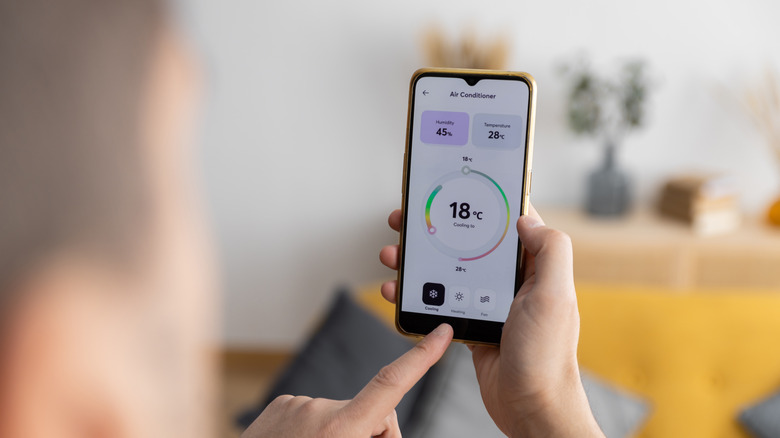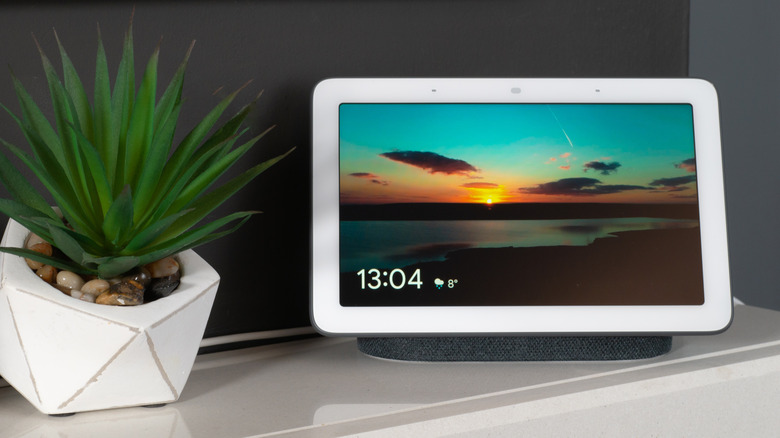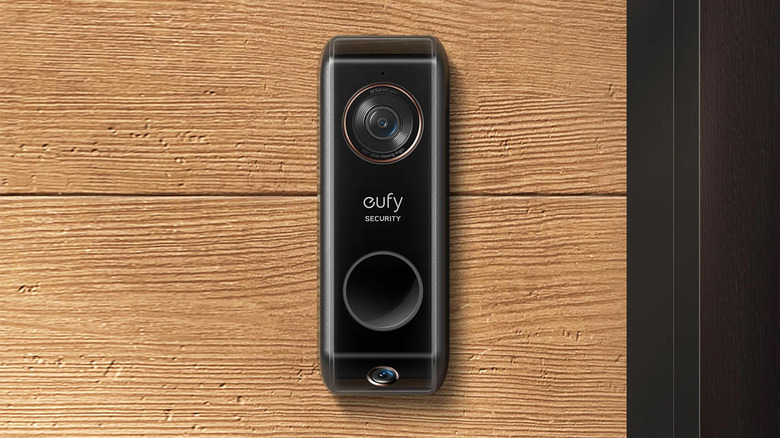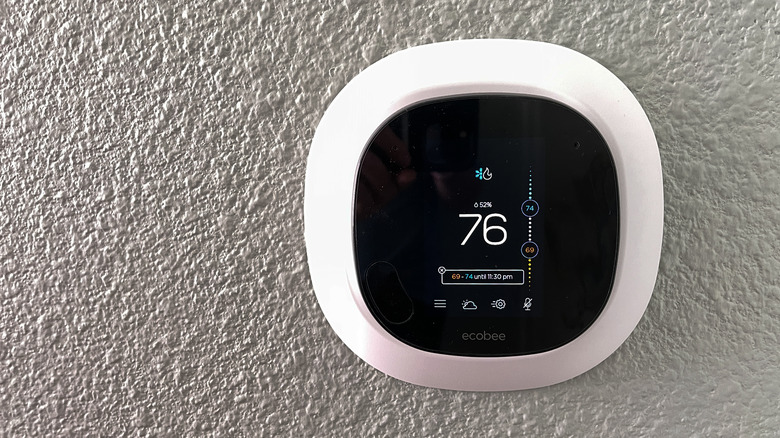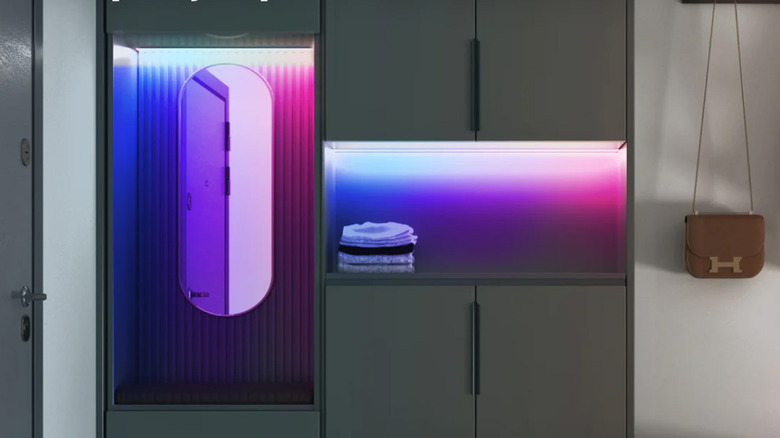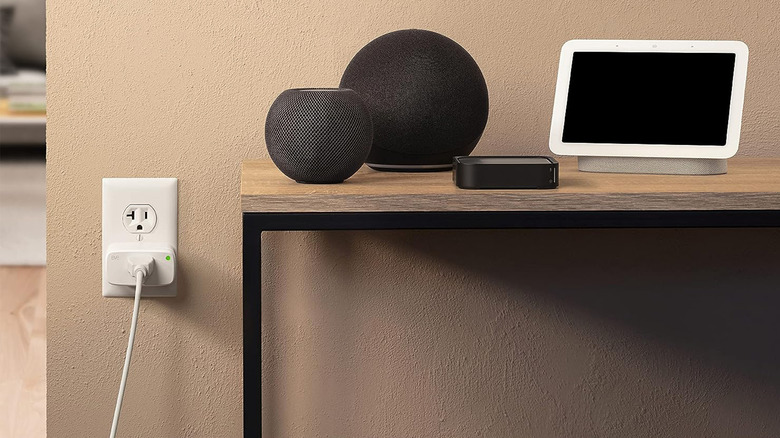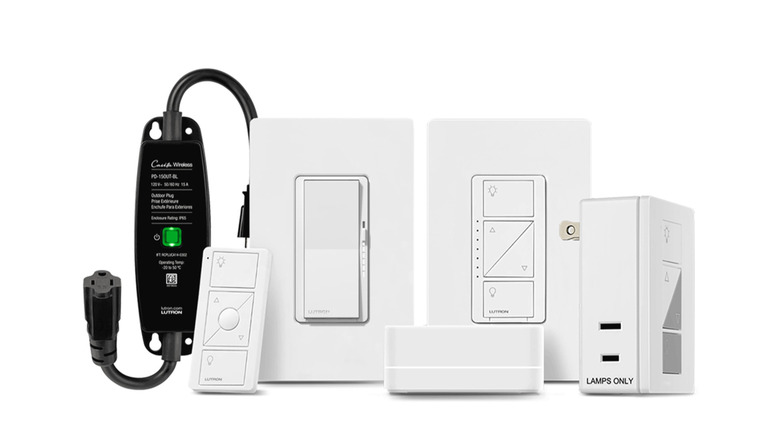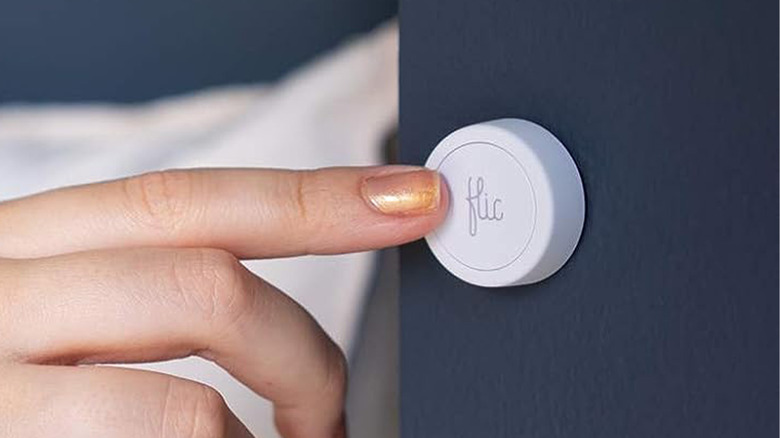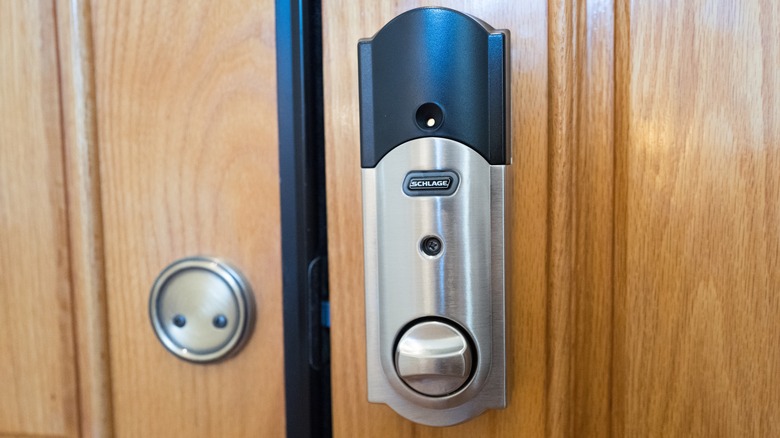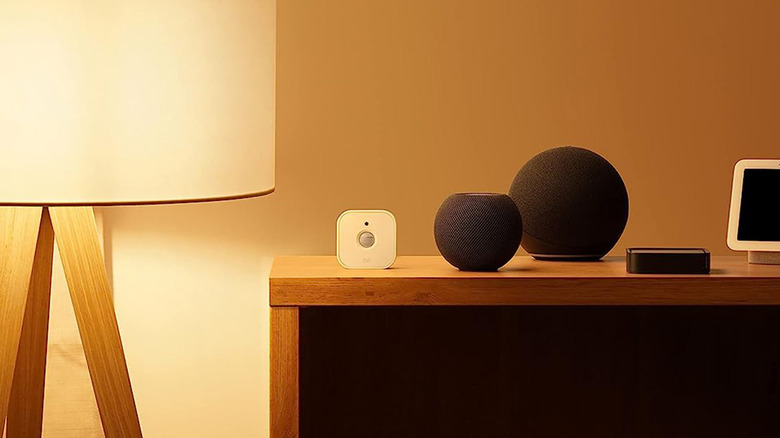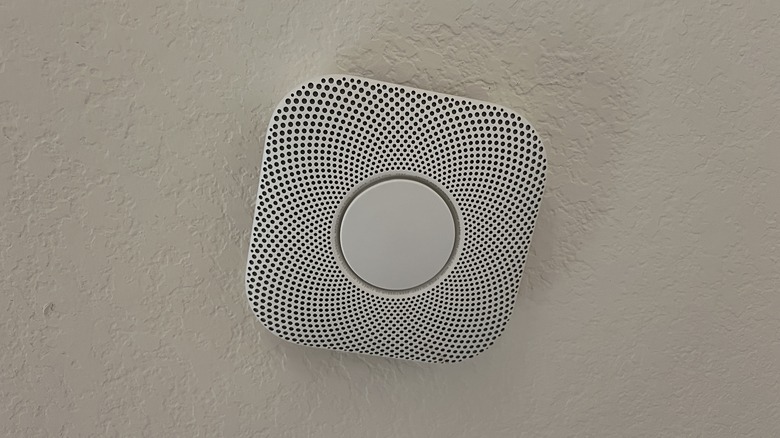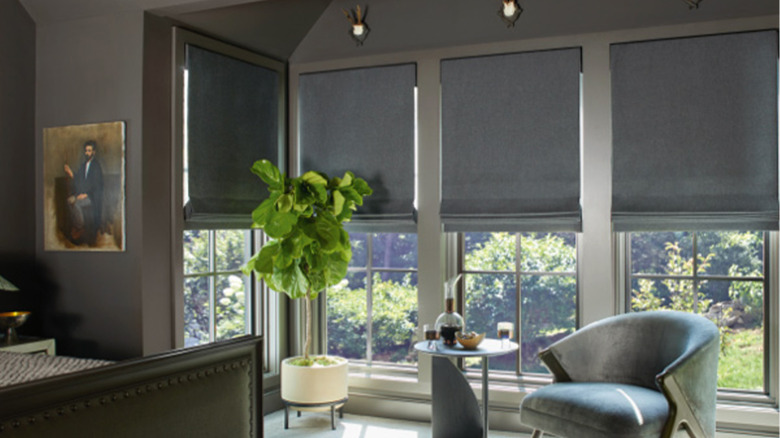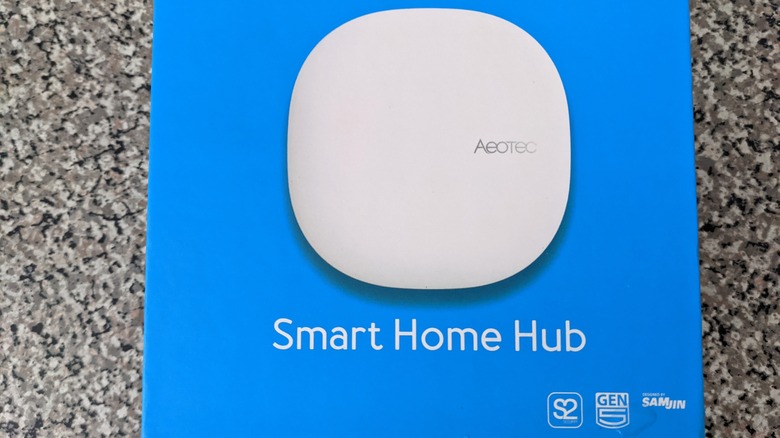12 Must-Have Devices To Transform Your House Into A Smart Home
We may receive a commission on purchases made from links.
Smart home technology is like something out of a sci-fi movie. It's possible to control almost anything that runs with electricity in your home with a tap of a finger. The experience has even improved dramatically from just a few years ago. Now we have things like Matter, a universal smart home standard that simplifies compatibility. Threads is also pretty neat. It's a networking protocol that assists in connecting smart home devices within your home.
These tools are also not as daunting as they used to be. You need fewer and fewer apps to make everything work, and the apps you do have to use work better than they used to. Matter is going to clean things up even more as products update and launch with the new standard. There's never been a better time to at least start looking at smart home gadgets.
Below is a list of must-have smart home gadgets that'll get you on the right track. The listed devices are nearly universally useful and easy to integrate into an existing house. For example, a smart thermostat is relatively cheap and easy to install compared to something like a smart refrigerator.
A smart speaker
One of the first things a smart home renovation needs is a smart speaker. These not only provide your house with music but also a direct line to your smart home gadgets via your voice. At the end of the day, it's simple to just ask Google, Siri, or Alexa to control your gadgets. Speakers with central placements get you a lot of coverage. Since all smart speakers link together pretty easily, adding more to your home only takes a couple of minutes.
Here's the rub, though. You are confined to your ecosystem when you choose your smart speaker. Thus, if you go with, say, a Google Nest Hub, you'll be in Google's ecosystem. You'll need to ensure that all smart home tech you purchase moving forward is directly compatible with Google Assistant. This isn't usually a big deal, and some folks even mix-and-match speakers. However, it's best for efficiency if you only buy one brand.
There are three main competitors in this space. The Google Nest, Amazon Echo, and Apple HomePod are your best bets. Most mainstream smart home tech works with all three. In addition, all three competitors support both Matter and Thread, so there is future-proofing there. Samsung has SmartThings, and it's pretty good if you buy Samsung appliances, but it's not quite as good as the big three.
EUFY Smart Doorbell
One of the first purchases a lot of home buyers make is a smart doorbell. For this, EUFY makes some good products. There are a few to choose from, including the C210, S220, and S330. The S220 and S330 are the main products, and support features like 2K video, built-in storage for video, HDR support, and more. The C210, by contrast, is a budget-friendly option that still has many of the features of its more expensive siblings but records video in 1080p instead of 2K. All can make use of the house's wiring, and the company also makes a wireless door chime.
What makes EUFY devices good is that you can use most of their features without a monthly fee. That's in comparison to something like the Google Nest doorbell where you need a subscription to get most of the features. EUFY does have a subscription service that goes for either $2.99 per camera per month or a flat $9.99 for up to 10 cameras per month. It includes cloud storage to store more video. Everything else works without a subscription. You do need a hub, though, which isn't ideal if you only want one doorbell.
Of course, there are other excellent options available. The Ring Video Doorbell and Google Nest Doorbell are popular, if more expensive long-term. EUFY doorbells don't support Homekit, even though their outdoor security cameras do.
Ecobee 3 Lite smart thermostat
A smart thermostat is an easy upgrade in a growing smart home. It uses the wires you already use to connect your regular thermostat, so installation is fairly simple as long as you read the instructions and take your time. The ability to control your home's temperature with a smart speaker or smartphone is a serious boon, especially if you travel. It's also easier to do things like temperature scheduling on a smart thermostat since it has a more robust menu system than regular thermostats.
For this, the Ecobee 3 Lite is an excellent option. It's relatively inexpensive compared to many other smart thermostats, and its simple UI makes adjustments a breeze. It doesn't have the glitz and glam of more expensive products, but it gets the job done. You can even do some fun things like define an upper and lower limit. The thermostat will automatically turn on the heat or AC depending on which limit it hits.
What makes the Ecobee 3 Lite appealing is its simplicity. The app is simple, and everything works as it should. This is also a space with many great competitors, including the Nest Thermostat, which is a much smarter option if you're going for that. Amazon, Honeywell, and Mysa also have good smart thermostat options.
Wyze smart lights
Smart lighting is another smart home upgrade that a lot of folks make early on. This is a fiercely competitive market that includes Philips, Meross, Lifx, Nooie, Govee, and Nanoleaf. As with the smart speaker, it's a good idea to stay within one family of smart lights if at all possible. You can mix and match, but each new smart light requires a different app, which can be exhausting to use over a long period of time. Plus, some need hubs, and having multiple hubs for just lights is an awful experience.
Wyze is a dependable option that plays up to 16 different colors on the same light strip. The ability to use multiple colors on a single strip at once is a nice feature. For setup and use, it's fairly straightforward. Each bulb or strip individually connects to your router, and you can control them with your smart speaker or smartphone via an app. They're bright, colorful, and get the job done for less money than most competitors.
Each competitor in this space has its pros and cons. Philips Hue lights are very easy to manage and offer a clean experience. Nanoleaf has some interesting solutions like its smart light panels. It really comes down to your individual needs, so it's recommended to check out the competition to see what suits you best.
Eve Energy smart plug
Smart plugs are very useful devices. You plug them into your existing wall outlet and then control them from your smartphone or smart speaker. Whatever gets plugged into the smart plug is then controllable. An excellent use case for this is Christmas lights. You can program the plug to turn on and off at set times of the day, so you don't have to do it manually. Smart plugs are generally easy to set up, and you can move them around whenever you need to.
Eve Energy makes a good smart plug. It comes with plenty of automation and scheduling options to fit a wide variety of circumstances. Setup is fairly simple, and the device lets you monitor energy usage for energy-saving purposes. It also supports Google Assistant, Amazon Alexa, and Apple Homekit along with Matter. Perhaps its most nifty feature is doubling as a Thread router to connect other Thread devices. That makes Eve Energy's option more versatile than other products like it.
There are many competitors in this space, including selections from Govee, Leviton, GE, and others. You can find cheaper ones and more expensive ones depending on your needs. Eve Energy is on the higher end, price-wise, but it also has more features. If you just need smart plugs to control Christmas lights, you can probably go with a cheaper option.
Lutron smart switch
Smart switches can automate a lot of things while also turning them on and off. Some even come with sensors that automatically turn lights on and off as you walk through the house. The other benefit of smart switches is that they still act like regular switches. Thus, you can disconnect them from Wi-Fi and use them like any old dumb switch.
Lutron is one of the stronger names in this space. The company uses its Caséta smart home system in all of its products so you can mix and match as needed. In addition to the standard light switch, you can get switches with dimmers and fan controls. There is also an optional motion sensor in case you want that level of hands-off automation. Lutron tends to be more expensive than most competitors, but the quality is there. It includes support for Google Assistant, Alexa, and Homekit.
There are other competitors in this space. Leviton, GE, Brilliant, TP-Link, Feit, and Enbrighten all make smart switches. They range from well under $100 to well over $100, so you can shop based on your budget and personal needs. The only inconvenient part of smart switches is replacing your regular light switch. It's not terribly difficult to do, but those who aren't confident in their ability to wire things may want to call an electrician.
Flic 2 smart buttons
Smart buttons are niche, but useful products. They work by conducting a set of automations or commands every time you press the button. So, for example, you could program one of these to turn off or dim your lights, lock your smart door lock, adjust your thermostat, and set an alarm on your smart speaker. Place the button next to your bed and you no longer have to wonder if you remembered to lock the door. It's possible to set up these tasks individually for each piece of smart home tech. However, sometimes it's easier to press a button.
There are several good options here, but Flic makes a decent product with the Flic 2. You can get a set of three for about $80, with bundles online that come with the required hub, as well. It features the same level of control as most other smart home buttons, and it integrates with Amazon Alexa and Apple Homekit routines for some added functionality. There is also Google Assistant support. Flic has committed to supporting Matter, but the Flic 2 buttons don't have it yet.
There are other companies that make smart buttons. Govee, Aeotec, TP-Link, and even Philips make one for its Philips Hue lights. You should check out the various options to see which one works best for you. Flic is in the middle of the road when it comes to price, so it's a solid place to start.
Schlage Encode Deadbolt smart lock
Smart locks are another easy upgrade for a smart home. They replace the deadbolt on your door. That makes them easy to install since you can remove one and add the other without much drama. The only downside to smart locks is that they're battery-operated. Most smart locks give you notifications when your battery gets low. Fortunately, most smart locks come with a mechanical backup in case the battery dies, so it can still operate as a normal lock.
Schlage Encode Deadbolt is a good entry point, pun intended. It features a simple, timeless design, multiple colors, and it includes a regular key in case the battery dies. Additionally, it has a keypad along with smart functionality so there are no less than three different ways to get into the house. Schlage also sells a matching lever set if you want to keep your deadbolt as it is and replace the doorknob, instead. It doesn't work with Matter, although future locks likely will. However, it does support Google Assistant, Alexa, and Homekit so you can still use it with voice assistance.
This is another very competitive space. August, Ultralog, Wyze, and Yale make excellent products. There is essentially parity in the smart lock space, so you can select the one that looks best with your door. Those looking for Matter support will need to wait because Matter smart locks only started rolling out in the summer of 2023.
Eve Motion smart motion sensor
Smart sensors are picking up steam. There are sensors for many things, and it can be difficult to keep track. The most common type of sensor is a motion sensor. Smart motion sensors notice motion and then activate other devices as you command. One such example is keeping one by your front door that turns on the lights automatically when you enter the house. The automation part of sensors is what makes them excellent for smart homes.
The Eve Motion Sensor is arguably the best of the bunch. It features a motion sensor, a light sensor, and support for both Matter and Thread. There is also IPX3 splash resistance, which helps it handle rainwater if you intend to use this outdoors. It's powered by two AA batteries, and it's small enough to stash just about anywhere. It doesn't get much better than this, although the Eve Motion Sensor is a bit expensive at $49.99.
There are a variety of sensors from different brands. For example, Ring makes a flood and freeze sensor to detect water in your home. Some smart thermostats like the aforementioned Ecobee 3 Lite have optional temperature and humidity sensors to see temperature differences around your home. You can deck out your whole house in sensors if you want to, or just get a couple for security or automation purposes. The world is your oyster.
Google Nest Protect fire and CO alarm
A smart fire alarm and CO detector can help automate your home's safety. There is a clear winner in this space with the Google Nest Protect. It supports Google Assistant, Amazon Alexa, and Apple Homekit via a Homebridge. At its core, it works like a regular smoke and CO detector. It'll alert you when it detects something amiss.
The smart part is more about usability. The bottom of the device has a button that also acts as a light. A green light means that everything is all good while a red light means something is wrong. At night, it can even glow white for use as a night light. Google Nest Protect also talks to you when it detects something is wrong, and it'll tell you where the issue is if you have a device in multiple rooms. There is app integration as well where you can check battery status and any alerts, even if you're not at home. If the Nest Protect loses Wi-Fi connection, it still functions as normal, you just won't get alerts on your phone.
Google doesn't have much competition in this space. Amazon Echo and Apple Homepod devices can listen for regular smoke and CO alarms and then let you know if it hears one. OneLink makes a competing product that works okay provided that you don't need Google Assistant support.
Lutron smart blinds
Smart blinds are a luxury of sorts. While they certainly work better than normal blinds, this one isn't entirely necessary. However, not having to spend the first few minutes of every day opening every blind in your house to let in sunlight can save you a ton of time over the long run. The nice part about smart blinds is that they're easy to find and use. Unfortunately, they also tend to be pretty expensive even if you're just looking for something basic. Lutron does it about as good as any smart blinds brand but adds in a metric ton of options to fit your home.
Lutron smart blinds support Google, Apple, and Amazon voice assistants, so there are no worries when it comes to compatibility. The blinds can be manipulated in a number of ways, including putting them on a schedule to open and close automatically. That can not only save you time, but controlling who can see into your house while you're not there is also nice. Most smart blinds can do at least that much. You can get motorized shades, curtains, and blinds. Each option also usually comes in multiple colors.
There is some competition in this space. SmartHome makes a roller shade that is solar-powered. Graber and Ikea also make motorized shades that you can control with your smartphone. Lutron is the most expensive, but it also has the most options.
Aeotec Smart Home Hub
Some tech needs hubs while others can connect to just your home Wi-Fi. You can alleviate the need to stack multiple hubs on top of one another by having a universal hub that connects to everything. Aeotec is one of the best options in this space. It works with Zigbee and Z-Wave devices along with Matter and Thread. It should also work with every voice assistant, including Samsung's SmartThings. The only thing it doesn't work with is Apple Homekit.
Once you connect all of your smart home tech to the device, you use the app or your smart speakers to issue comments to the smart hub, and the smart hub takes that command to the device. A universal hub keeps everything clean and functioning properly. You need to take some extra steps to get it to work with Google Assistant and Alexa, but it's worth it.
Technically, smart speakers act as hubs. You can connect your smart home tech to it and use the voice assistant to control your smart home tech. That also requires you to integrate it into a smartphone app. Thus, you can use a smart speaker as a hub of sorts. There are also some drawbacks to using a universal hub like this one. For example, you can connect Philips Hue lights to the Aeotec Smart Hub, but you'll lose some functionality that you get when attaching it to a Philips Hue Hub. Beyond this, a smart hub is a solid investment.
